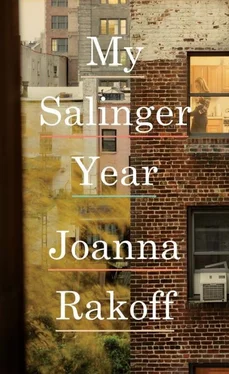And then, unbidden, I thought of Salinger. My whole life seemed to have narrowed down to Salinger, Salinger, Salinger, in this case a line from “De Daumier-Smith’s Blue Period.” The narrator of the story, a teacher at a correspondence-based art school, writes a letter to his one talented pupil, urging her to invest in good oils and brushes, to commit to the life of the artist. “The worst that being an artist could do to you would be that it would make you slightly unhappy constantly.”
Could I allow myself to be slightly unhappy constantly? I thought about the way my college boyfriend looked at me—I had never, not ever, disappeared before his eyes—and the way his skin felt in the morning, warm and loamy, and the long nights we’d spent talking, ever since we’d met, the vibration of his low voice in my ear. For a moment, I allowed myself to miss him—to truly miss him—and the pain that shot through me was almost physical. I ached for him. I loved him. I wanted him. But right now I needed to be slightly unhappy constantly.
Slightly unhappy constantly alone.
One afternoon in November, my boss came running out of her office, cigarette in hand, calling for Hugh. What happened? I wondered. It had been ages since the last yelling-for-Hugh incident. She’d been subdued since the summer, understandably. This time, she seemed less panicked, more shocked. Before Hugh could emerge from his office, she turned to me, tapping her slender foot. “Do you know who that was on the phone?” I shook my head as Hugh—with a great rustling of paper—hustled out of his office, smoothing his hair.
“What happened?” asked Hugh.
“A reporter just called for me,” said my boss. “From some paper in D.C.”
“The Post ?” asked Hugh. I could see him trying to make sense of the situation without having to be told. The mark of a genius assistant.
A stream of smoke swirled into my boss’s face and she stepped back, waving it away, flecks of ash dropping onto the carpet. “Not the Post . The Journal ? Some paper I’ve never heard of.” She looked at us. “It seems Roger Lathbury talked to them. About ‘Hapworth.’ ”
“You’re kidding.” Hugh had that look on his face, as if he had bitten into something spoiled and wasn’t sure if he should spit it out or swallow.
“Nope.” My boss smiled grimly, her mouth closed.
“Did you talk to them?” asked Hugh.
“Of course I didn’t talk to them,” she cried. With a laugh, she shook her head. “I can’t believe Pam even tried to put that person through.”
“Are you sure Roger talked to them?” Hugh scratched his chin.
“How else would they know about the book?” With one swift gesture, my boss stubbed her cigarette out in the ashtray that sat on the credenza by Hugh’s office. “Jerry certainly didn’t tell them about it!”
Hugh said nothing, his mouth sealed into a tight line. He had known this would happen. He had not trusted Roger from the start.
I had, though. I had trusted Roger. I’d not thought he’d do something like this. I had , it was true, feared that he’d mess the deal up through some sort of weird nervous behavior. I’d not thought, though, that he’d do the thing Salinger most abhorred: talk to the press.
“Do I tell Jerry about this?” my boss mused, tapping a long finger on the credenza.
Hugh raised his eyebrows in a gesture of befuddlement. “I guess you have to,” he said. “He’s not going to be happy.”
No, I supposed he wouldn’t. Part of me wondered why exactly we had to tell Jerry. He would never see the story, would he? In some obscure paper? No. But I supposed this had more to do with Roger: If he was talking to this little paper, then he would certainly talk to bigger ones. And then there was the larger issue—what was really at stake—that Roger simply couldn’t be trusted. He wasn’t the kindred spirit Jerry had thought him. He was a phony, just like everyone else.
My boss retreated to her office without ceremony and closed the door. It was a long time before she emerged again. “What did he say?” Hugh called.
“Nothing,” said my boss. “He thanked me for telling him. He sounded a little sad.” She herself sounded a little sad.
“Well, he thought this guy was a friend,” said Hugh, appearing in his doorway. Hugh, I knew, had not believed in any of this from the start. He thought it all ridiculous. He didn’t, however, seem pleased to have been proven correct. He, too, seemed simply sad.
A few days later, as dark closed in around me, my boss already gone—her smoke still lingering viscously in the air—Salinger called. “I’m so sorry, Jerry,” I said. I had only recently been able to actually call him “Jerry” and it still felt strange. “My boss has left for the day.”
“That’s okay,” he said in his pleasant way. “I can talk to her tomorrow. Could she call me in the morning?”
“I’ll have her call you first thing,” I said.
“Hey, Joanne, let me ask you a question.” For the first time, this sentence did not fill me with anxiety. “What do you think of this Roger Lathbury fellow?”
I didn’t question why he was asking me again. “I like him,” I said. “I think he’s a good guy.”
“I do, too,” he said, his voice a bit more hoarse than usual. A bit sad, I supposed. “I do, too.” It was over. I knew. The deal was off. The contracts were signed, but they gave Jerry full power, full control. Jerry could call off the deal at any time.
“Take care, Joanne,” he said.
“Jerry,” I said. For the first time, his name felt comfortable coming out of my mouth. There was so much more I wanted to say. “Jerry, good-bye.”

I never wrote back to the boy from Winston-Salem.
I never wrote back to the veteran in Nebraska, for I could not bear to tell him that his friend was no relation to me. My father had confirmed this, with some disappointment—no one in his small family had served in Germany during World War II. Perhaps this was where I got it from—my belief in fate, in magic, in felicity, the mermaid lagoon. From my father.
Nor did I write again to the high school girl. Her rage was too enormous for me to bear. And what could I say to her but Wait, wait, and you’ll see. It gets easier once you’re no longer graded, once you have to assess your actions for yourself .
I should have, I suppose. I should have written and told her exactly that, though surely I would have only fanned her flames. But she’s haunted me all these years, as has the veteran, and the boy from Winston-Salem, whose letter I still have, its creases soft from wear. I keep it pinned to the cork-board above my desk, a talisman, a reminder. In some ways, I wish I’d taken them all. The thought of them, those letters, those documents of so many people’s lives, just tossed away, grows more and more unbearable as the years pass. I could have saved them and I didn’t.
When I gave notice, my boss stared at me in disbelief. “But you were doing so well,” she said. “You sold that story and—” She didn’t finish. “I was so sure you were an Agency Type of Person.” The sadness in her pale eyes was too much for me, though I knew this sadness was not really to do with me. She had lost so much, so many, in the last year. Max had just left, too, in a storm of rancor, his office abandoned nearly overnight. Losing her assistant was nothing in comparison. I was eminently replaceable. The city was full of boys and girls like me, clamoring at the gates of literature. And yet—and yet—I wavered, as she tried to dissuade me. “Why?” she asked me.
Читать дальше













